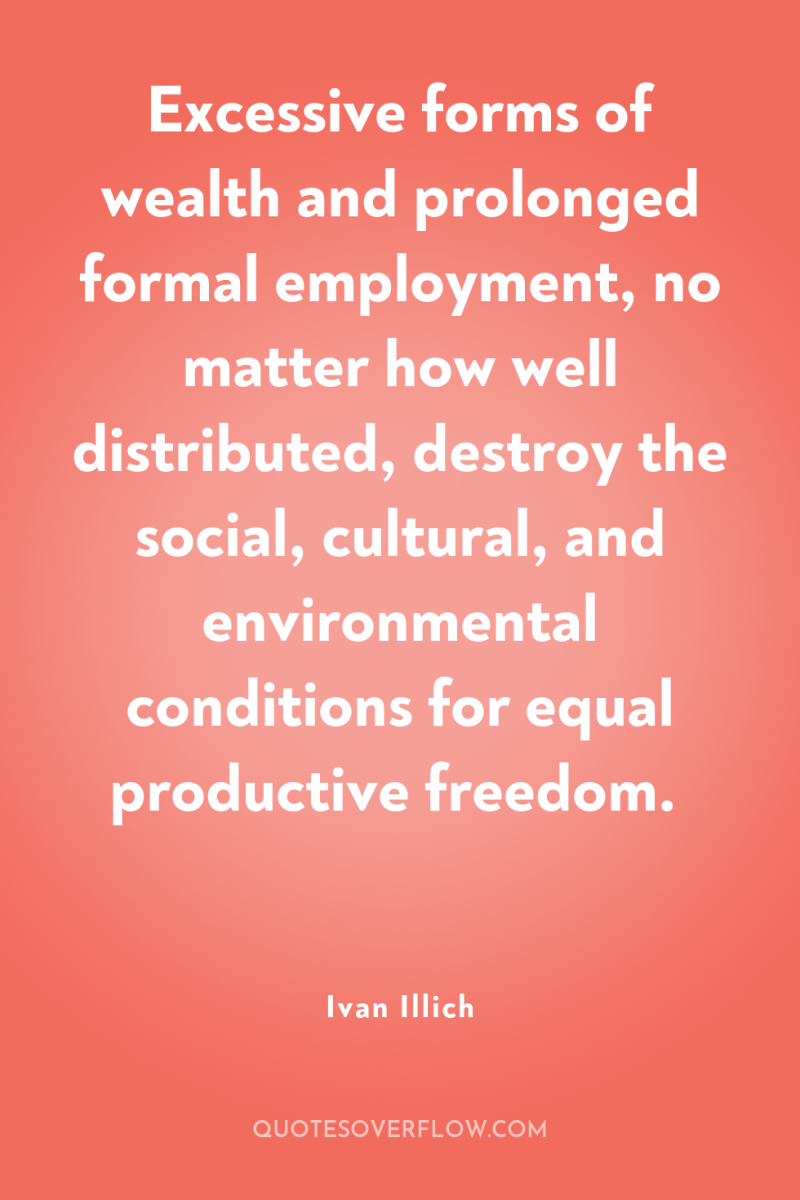1
We are the witnesses of a barely perceptible transformation in ordinary language: verbs which formerly expressed satisfying actions have been replaced by nouns which name packages designed for passive consumption only -- 'to learn' becomes 'to accumulate credits'.Ivan Illich
2
Today, one must either be isolated and cut off, or a carefully guarded, affluent drop-out, to allow one's children to play in an environment where they listen to people rather than to stars, speakers, or instructors. All over the world, one can see the rapid encroachment of the disciplined acquiescence that characterizes the audience, the client, the customer.Ivan Illich
3
Work done off the paid job is looked down upon if not ignored. autonomous activity threatens the employment level, generates deviance, and detractsâ€â€¹ from the GNP..Work no longer means the creation of a value perceived by the worker but mainly a job, which is a social relationship. Unemployment means sad idleness, rather than the freedom to do things that are useful for oneself or for one's neighbour. An active woman who runs a house and brings up children and takes in those of others is distinguished from a woman who 'works, ' no matter how useless or damaging the product of this work might be. .Ivan Illich
4
A society dedicated to the protection of equally distributed, modern and effective tools for the exercise of productive liberties cannot come into existence unless the commodities and resources on which the exercise of those liberties is based are equally distributed to all.Ivan Illich

5
Excessive forms of wealth and prolonged formal employment, no matter how well distributed, destroy the social, cultural, and environmental conditions for equal productive freedom.Ivan Illich
6
The quality of a society and of its culture will depend on the status of its unemployed.Ivan Illich
7
Our market-intensive societies measure material progress by the increase in the volume and variety of commodities produced. And taking our cue from this sector, we measure social progress by the distribution of access to these commodities. Economics has been developed as propaganda for the takeover by large-scale commodity producers.Ivan Illich
8
In the Middle Ages there was no salvation outside the Church, and the theologians had a hard time explaining what God did with those pagans who were visibly virtuous or saintly. Similarly, in contemporary society effort is not productive unless it is done at the behest of a boss, and economists have a hard time dealing with the obvious usefulness of people when they are outside the corporate control of a corporation, volunteer agency, or labour camp.Ivan Illich
9
The world-wide discrimination against the autodidact has vitiated many people's confidence in determining their own goals and needs. But the same discrimination has also resulted in a multiplicity of growing minorities who are infuriated by this insidious dispossession.Ivan Illich
10
Wherever the shadow of economic growth touches us, we are left useless unless employed on a job or engaged in consumption... We lose sight of our resources, lose control over the environmental conditions which make these resources applicable, lose taste for self-reliant coping with challenges from without and anxiety from within.Ivan Illich
11
The first enslaving illusion is the idea that people are born to be consumers and that they can attain any of their goals by purchasing goods and services.... What people do or make but will not or cannot put up for sale is as immeasurable and as invaluable for the economy as the oxygen they breathe.Ivan Illich
12
All governments stress an employment-intensive force of production, but are unwilling to recognize that jobs can also destroy the use-value of free time. They all stress a more objective and complete professional definition of people's needs, but are insensitive to the consequent expropriation of life.Ivan Illich
13
In the late Middle Ages the stupefying simplicity of the heliocentric model was used as an argument to discredit the new astronomy. Its elegance was interpreted as naivete... Just as the legendary inquisitor refused to look through Galileo's telescope, so most modern economists refuse to look at an analysis that might displace the conventional centre of their economic system.Ivan Illich